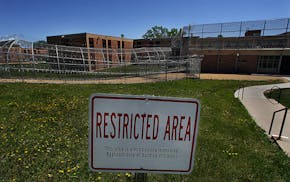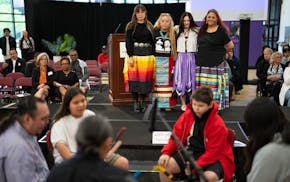Accusations of plagiarism have marred the shuttering of an ambitious antiracism research center run by the University of Minnesota, but it was racked with internal tension and dysfunction long before its announced closing.
The university said last week that it will close its Center for Antiracism Research and Health Equity, a day after founding director Rachel Hardeman resigned from the school. The center was launched in early 2021, less than a year after the murder of George Floyd, as institutions both public and private committed to dismantling structural racism.
In interviews, more than a half-dozen former employees, students and faculty affiliated with the center described how it struggled from the outset to keep up with the pace of work and never recovered. Some said they felt misled by the center's promise to help communities of color and that Hardeman, with too many responsibilities, was borderline unreachable as the center's leader.
Some, including Hardeman, said the center received too little administrative support from the university at a time when institutions were under intense pressure to pursue racial equity projects in the fallout of Floyd's murder by Minneapolis police.
Over time, the center's staff dropped from as many as 25 workers down to six.
"Wouldn't it have been nice to say, OK, funding's here, let's take a year to quietly strategize and build and then announce our existence? Perfect world," Hardeman, said in an interview. "That's certainly not what the university wanted, it's not what the funders wanted."
Not the utopia it made itself to be
The center launched in early 2021, boosted by a $5 million donation from Blue Cross and Blue Shield of Minnesota. As the staff grew, it billed itself as a haven for research on subjects long ignored by predominantly white institutions.
But two doctoral students, Hadija Steen Mills and Kene Orakwue, said their time at the center was mired by disorganization.
Hardeman was so short on time, the two students said they didn't have a chance to develop relationships with her. Orakwue said she met Hardeman only once during her first semester, while other advisers would often meet with their students once per week.
Orakwue and Steen Mills described how they were both given large roles on separate projects, but they lacked training and guidance, and they did not have enough time for their own projects.
Steen Mills said they had initially been drawn to the health equity center in part because of its purported commitment to researchers of color. She was ultimately disappointed.
"Society puts research, researchers, academics at a really high position of power and there is a long legacy of that position of power being abused and being used to exploit people of lesser power — Black and brown bodies," Steen Mills said. "CARHE was positioned as kind of a 'for us, by us' mentality, and then used a bait-and-switch tactic to really break that trust."
Jé Judson, a social and behavioral scientist early in her career at the center, said there were so many gaps in the administration that other employees had to step in.
"[There was] so much administrative, research and supervisory work," Judson said. "I couldn't do anything that would benefit me careerwise, like I was promised."
Credit in academia is centered around publication and authorship. Orakwue said she did not know the outcome of the grant she worked on at the center and assumed her work will never be published.
"CARHE was positioned to be this utopia of a center and was supposed to do all these amazing things … and ended up doing and repeating the same harms that academia frequently does," Orakwue said.
Hardeman: University was not supportive enough
In an interview with the Star Tribune, Hardeman did not contest assertions that the center struggled with its workload or that staff members lacked direction to complete projects.
But, she and some others formerly associated with the center argued the university did not provide enough support.
The university did not respond when asked by the Star Tribune about Hardeman's criticism and declined to make an official available for an interview. In a statement last week, Melinda Pettigrew School of Public Health dean, said the university remains "strongly committed" to advancing health equity and is "embracing this moment to reflect on what our community needs most, now and into the future."
With interest in racial equity skyrocketing in the aftermath of Floyd's murder, and with Hardeman already established as one of the few big names in her field, the center was pulled in too many directions from the start, multiple people said.
Within six months of launching, Hardeman said she began making multiple requests for additional administrative support from the university, which were not granted. For example, she said the School of Public Health gave the center one person to help with the administration of grants, but that person also had to split their time with around a dozen other faculty members within the school.
"With the amount of projects that she had … I think that we could have had one sole person supporting us on that," said Miamon Queeglay, the former director of community engaged research at the center.
Bottoming out
Despite the obstacles, the center had its achievements. It helped develop anti-bias courses for hospitals with birth centers as part of a 2021 state law meant to address racial disparities in maternal health and infant mortality.
It also launched a data tool to help researchers measure structural racism and its impact on the public.
Nevertheless, issues persisted.
Hardeman was publicly accused of plagiarism in April by a former research scientist at the center, Brigette Davis. Shortly after, Hardeman announced her plans to leave the school. Davis first confronted Hardeman about her accusations privately after learning of the incident in late 2022. Hardeman called it an honest mistake.
Davis said she did not file a complaint with the university, but word about the incident still spread. At least four complaints were filed by two faculty members against Hardeman in 2024, according to copies of the complaints obtained by the Star Tribune. It appears Hardeman was not punished.
That year, Hardeman went on sabbatical and was replaced by several interim directors. After Hardeman left, the lack of direction in the office completely bottomed out, Steen Mills said.
Hardeman returned to the center in January of this year. By March, records show, she began formally negotiating a separation agreement with the university.
The center is scheduled to close May 30, almost five years to the day of Floyd's murder and little over four years after the center launched.
In a statement released last week, Hardeman said the "closure is not a reflection of [the center's] work." She said it was "a reflection of the University's failure to support, protect, or sustain antiracism work when it becomes inconvenient."
Diversity and equity programs at colleges throughout the country have been under attack as federal funding has been cut.
Hardeman has not said what her next professional move will be. And unlike some of her staff, she has not given up hope for antiracist research in academia.
"I don't think we should rule academia out. That would be a loss for far too many people and far too many communities and populations," she said. "I have to think it's possible. I will always be a researcher and an academic."
Man admits to fatally choking girlfriend in her downtown St. Paul home

The Minnesota Legislature passed a big cannabis bill. Here's what's in it.

What did — and didn't — get done at the Minnesota Capitol this session

2 escapees from St. Peter sex offender facility were living in unlocked area, state says

